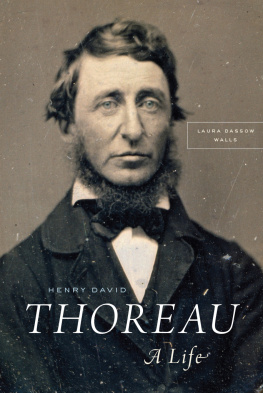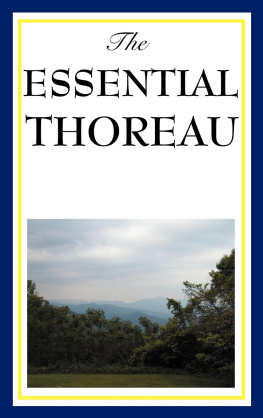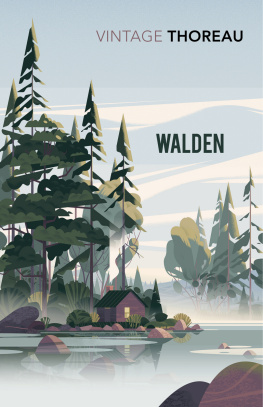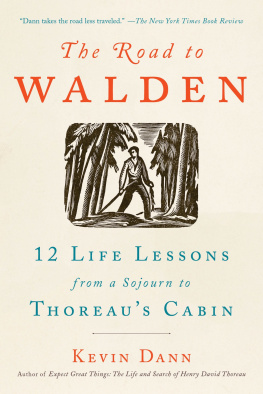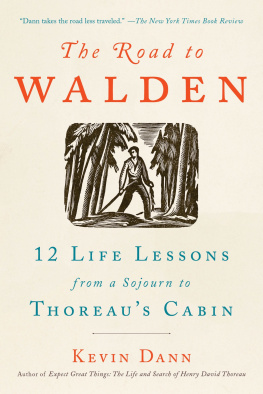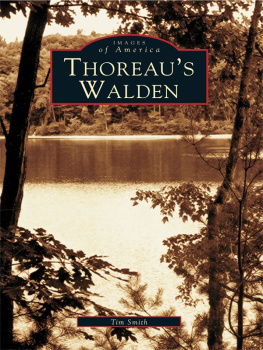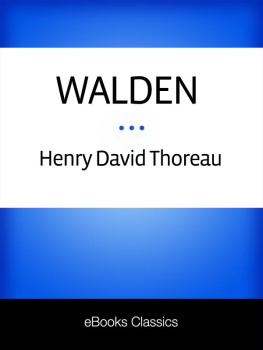What youthful philosophers and experimentalists we are! There is not one of my readers who has yet lived a whole human life.
Henry David Thoreau, Walden
Everyone who comes to Thoreau has a story. Mine begins in a neighborhood bookstore where I pulled a book off the shelf simply because it was small and greenlike the little green book Id been carrying around (filched from my fathers library) by a writer named Ralph Waldo Emerson. There is one mind common to all individual men, it opened. Of the works of this mind history is the record. To a restless, idealistic teenager, this was catnip. And here was a second green book! This one had a double title, Walden and Civil Disobedience: I have lived some thirty years on this planet, I read, and I have yet to hear the first syllable of valuable or even earnest advice from my seniors. That made sense. Dont trust anybody over thirty, we were all saying, for the adult world was clearly mad. Every afternoon I brought the newspaper in off the front porch and read the headlines: how many soldiers had died in Vietnam, where the latest riots were burning, which of my heroes had just been assassinated. Here is life, continued the new green voice, an experiment to a great extent untried by me; but it does not avail me that they have tried it. More catnip! I bought the book and brought it to school. Next time I was marched to the mandatory football rally, I split off at the door, sat on a grassy rise nearby, and opened my copy of Walden, holding it high so my teachers could see the title. They left me alone, and Ive been stepping to the music of that different drummer ever since.
Thoreaus roots were in Concord, Massachusetts, where he was born in 1817far from the Seattle of 1970. Yet had Thoreau lived a normal life span, my grandmother could have shaken his hand; our world is that close, in many ways the flower and fruitage of his. Two hundred years ago, American democracy still felt raw, experimental, and uncertain, especially in Concord, where America was a family affair, earned by one generation and about to pass to the next. Thoreau felt the weight of that responsibility more than most, and when he returned home from college, he set about reexamining the roots of democracy for himself. For it was clear to him that the American Revolution was incomplete: inequality was rife, materialism was rampant, and the American economy was wholly dependent on slavery. Yet in a terrible irony, his elders seemed content to let this state of things, from which they all benefited, continue. No, they were not to be trusted; he must try the experiment for himself.
By the time Thoreau built his house on Walden Pond at the edge of town, he had come of age among a circle of radical intellectuals called Transcendentalists, for their belief in higher ideas that transcended daily life. Emerson was their leader; he had moved to Concord while Thoreau was at Harvard, class of 37. Back home, Thoreau found his new neighbor declaring Americas intellectual independence, even as his own household had become a hotbed of antislavery activism. Thoreau joined the new revolution, but by 1844 he was less certain that Emerson, now his mentor, had all the answers. The dilemma that pressed upon him was how to live the American Revolution not as dead history but as a living experience that could overturn, and keep overturning, hidebound convention and comfortable habits. Moving to Walden Pond thus had a double purpose: it offered a writers retreat, where Thoreau could follow his calling as spiritual seeker, philosopher, and poet; and it offered a public stage on which he could dramatize his one-person revolution in consciousness, making his protest a form of performance art.
In writing Walden, Thoreau encouraged his readers to try the experiment of life for themselves, rather than inheriting its terms from othersincluding himself. When he returned from Walden and became, once again, a working member of a large family in town, he tried to bring into the heart of workaday America his belief in life as a quest toward higher truth. Thoreau is often said to have turned to Nature, but what he actually turned to was, more exactly, the commonsspaces that, back then, were still open to everyone: woods, fields and hilltops, ponds and blueberry thickets, rivers, meadows, trails up nearby mountains, the long open beaches on the Atlantic shore. Nearly all his writings use landforms and watersheds to explore the commons, expanding our shared natural and intellectual heritage until it touches the Cosmos itself. When Thoreau sailed on the Concord and Merrimack Rivers, he traveled the deep stream of time; when he walked the shore of Cape Cod, he dabbled his toes in a wild ocean stretching around the globe; when he stood on the shoulder of Mount Katahdin, he breathed the thin chill air of a planet in stellar space.
This viewpointdeep time, planetary spacestructured Thoreaus thinking from his Harvard years onward. He read at least six languages; to him, literature was world literature, beginning with the written word itselfHomer, Virgil, the Bible, the ancient scriptures of India and China, Old English poetryon through the latest in German philosophy and science, French histories of the New World, Englands most advanced Romantic poetry, and Scotlands most vigorous prose. Thoreau filled dozens of notebooks with extracts from hundreds of volumes, creating his own working library: poetry, history, science, anthropology, travel, and exploration. His ferocious curiosity meant the least detail in his own backyard could speak to him of faraway times and places: farmers working their fields evoked Virgils Georgics; Arctic explorers helped him analyze winter in New England; Irish laborers showed him the Bhagavad Gita in the waters of Walden. Through the 1840s and 50s, Thoreaus commitment to social activism deepened as he linked the actions of his Northern neighbors to the perpetuation of slavery in the South, a connection that led to his famous acts of protest: his night in jail for nonpayment of taxes, his essay Civil Disobedience, his furious denunciation of Slavery in Massachusetts, his passionate support for John Browns attempted insurrection. When death stilled his voice just after the onset of the Civil War, Thoreaus friends mourned not only him, but also the loss of all the work he had begun and never lived to complete.
When I began writing this book, the term Anthropocene was a novelty: human beings, scientists were suggesting, had become a geological force changing the planet itself. As I worked, I realized that Thoreaus life span, though short, had been long enough to witness and record the arrival of the Anthropocene epoch in America. He was born on a colonial-era farm into a subsistence economy based on agriculture, on land that had sustained a stable Anglo-American community for two centuries and, before that, Native American communities for eleven thousand years. People had been shaping Thoreaus landscape since the melting of the glaciers. By the time he died, in 1862, the Industrial Revolution had reshaped his world: the railroad transformed Concord from a local economy of small farms and artisanal industries to a suburban node on a global network of industrial farms and factories. His beloved woods had been cleared away, and the rural rivers he sailed in his youth powered cotton mills. In 1843, the railroad cut right across a corner of Walden Pond, but in 1845 Thoreau built his house there anyway, to confront the railroad as part of his reality. By the time he left Walden, at least twenty passenger and freight trains screeched past his house daily. His response was to call on his neighbors to simplify, simplify. Instead of joining the rush to earn more money for the latest gadgets and goods from China, Europe, or the West Indiesfeeding an economy that grew mindlessly, he wrote, like rank and noxious weedshe called for mindful cultivation of ones inner being and ones greater community, a spiritual rather than material growth through education,

